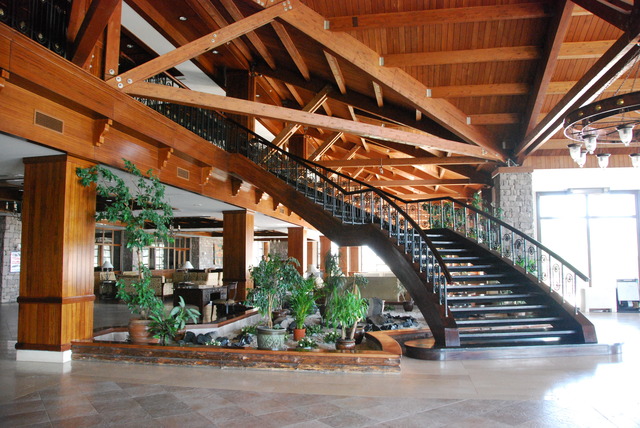We were flabbergasted! It was 7:00 PM. The sun was setting, it was getting late, we were hungry, and everyone had expected to spend the night in Erzurum. Armen did not mention that we were leaving the city. Everyone was tired because we had been on the road since 10:00 AM in the morning, we had not stopped for lunch, and we had a two hour ride ahead of us to Sarikamis.
The final ‘s’ in Sarikamis has a little ‘comma’ under the letter in Turkish. That gives the letter ‘s’ an “sh” sound. The name is pronounced, “Sarikamish”, but spelled Sarikamis. My computer does not have squiggly underscored letters, so I’ve spelled it both ways in this piece as a reminder of the sound of the name.
We left Erzurum and continued to drive through rural Eastern Turkey. The sun set and the road was pitch black. As we continued, we noticed drops on the windshield and realized that it was raining. The only lights were from the occasional car or truck heading in the opposite direction. The highway had two-lanes: one lane heading in each direction. There were no lights on either side of the road. There was only darkness all around us.
Selcuk did a great job of driving in the dark, but we felt sorry for him because he celebrates Ramazan and had not eaten or had a drop of water since sunrise. He must have been exhausted.
Sarikamish was the site of a battle between the Russian and Ottoman Empires during the First World War. It took place from December 22, 1914 and January 15, 1915. The outcome was a Russian victory. Both sides had approximately 100,000 soldiers each. The war zone was almost 900 miles wide from the Black Sea to Lake Van. The forces were concentrated at each side of the border at the fortresses of Kars (Russian) and Erzurum (Ottoman).
The Ottoman troops were ill prepared for the brutal winter conditions and suffered major casualties. The elevation of the area ranges from 5000 to 6000 feet above sea level and winters are snowy and very cold. The Russian Tsar visited the battle front on December 30th, telling the head of the Armenian Church that “a most brilliant future awaits the Armenians.” With these words, the fate of hundreds of thousands of Armenians was endangered, as the Ottoman Empire perceived its large Armenian minority as a source of treachery and disloyalty and did nothing to discourage (and perhaps, encouraged) anti-Armenian feeling among its populace.
The relationship between the Armenians and the Ottoman Empire had already started to deteriorate after numerous massacres in eastern Anatolia during the 1890s. The Ottoman government claimed that it had a legitimate defence against a projected Armenian uprising in favor of a Russia and Western Allied invasion of the Ottoman heartlands. On his return to Constantinople, Enver Pasha blamed his failure to win the Battle of Sarikamis on the actions of the region’s local Armenians, initiating the repressive measures against the Ottoman Empire’s Armenian population. This was an early stage of the Armenian Genocide.
We finally saw lights high on a hill and drove up to a huge ski chalet! It was 9:00 o’clock at night and we had arrived at Sarikamis! We stepped out of the van, it was pitch dark beyond the hotel, and the air was actually quite cold. We had no idea what was “out there”. We hastened inside and registered. It felt like we had entered The Twilight Zone.
We entered the huge lobby of a hotel that could have been in any ski resort in the world: Vermont, Idaho, Chamonix, St. Moritz, Switzerland. There were heavy wooden beams on the ceiling and along the walls, big leather chairs, pictures of deep snow and skiers, and skis on stone walls.
In two hours we had travelled from hot noisy exotic Erzurum to a quiet, peaceful ski chalet in the middle of nowhere and we were the only guests in the entire hotel!
We freshened up in our rooms and then went down to dinner in the hotel dining room. Waiting there for us were “The Zeronians” from Pasadena, California. This was the other Armenian family that Armen had booked to join us during part of our Anatolian tour. Joe & Marilyn Zeronian, their two adult children, one spouse, and four grandchildren.
We also met our new guide, Satenik Usta. She is an Armenian who was born in Istanbul and spoke English and French as well as Turkish. Satenik had been guiding the Zeronians all around Istanbul and they all flew into Erzerum in the afternoon. Jemal, who is Selcuk’s father and the other half of the family business, picked up the Zeronians in his white Mercedes van at the airport and drove them around Erzerum before driving to Sarikamis earlier in the afternoon.
We sat down to a late Turkish dinner at a long table. Over dinner, we learned that Armen would ride with the Zeronians and that Satenik would be our guide for the rest of the trip. Soon afterwards, we finally went to bed. It had been a very long day……
